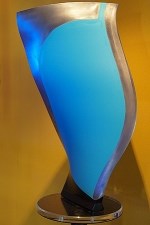GKN Aerospace funds new aero-engine composites technology
GKN-led G5Demo project will pursue new composites technologies at Linköping-based ACAB subsidiary, aimed to cut aero-engine CO2-emissions in half by 2020.

Aero-engine composite fan blade. SOURCE: GKN Aerospace
The GKN Aerospace-led G5Demo project, part of the Swedish Green Aerospace Demonstrator program, is to receive €2 million in funding from Vinnova (Stockholm-based Governmental agency for innovative systems). This funding will be matched by an equivalent investment from GKN Aerospace and will be provided over a two year period to support an increase in the scope of the G5Demo activity. The Green Aerospace Demonstrator program encourages the participation of Swedish industry and research establishments in international new technology demonstrator programs such as Clean Sky (European research project for introduction of new, radically greener Air Transport products). A particular goal is to increase small and medium-sized company/organization participation.

Vinnova compiled Flyg 2013,
Sweden's aerospace research and innovation plan to 2050.
G5Demo is an engine demonstrator program focused on progressing technologies that will cut aero-engine CO2-emissions by 50 percent by 2020. Two Swedish aerospace manufacturing technology centers are being supported: the manufacturing technology cent at Innovatum, Trollhättan which focuses on metals; and Linköping-based COMPRASER, which focuses on composites.
GKN Aerospace acquired Volvo Aero (Trollhättan, Sweden) in 2012 and was scheduled to complete integration by year-end 2013, becoming GKN Aerospace Engine Systems. A second Swedish facility is GKN Aerospace Applied Composites AB(ACAB) in Linköping — with appox. 70 employees and annual turnover of 130,000 Swedish Krona (SEK) or $20 million U.S. — which produces a wide range of products, from filament wound drive shafts, pressure vessels and missile components to resin transfer molded (RTMd) below-deck missile exhaust channels for Visby corvettes (73m/240-ft stealth Swedish Navy ships) to aerospace engine and structural components.
GKN Aerospace's contribution will be to introduce innovative manufacturing technologies and advanced materials to G5Demo, allowing the creation of light weight, state of the art engine structures which can then be validated in the full-sized aero-engines that form the project demonstrators. Through this project GKN Aerospace will be supporting Swedish universities, research centers and small/medium sized enterprises (SMEs), introducing them to international collaboration and working with them to progress and assess a variety of new technologies and processes.
Engine parts that are being developed through G5Demo include:
- A 15 percent lighter turbine structure that survives 200°C higher temperatures
- A composite/metal hybrid fan frame that is 30 percent lighter
- Rotating frames for 'open rotor' engines
- Compressor structures manufactured using 3D-printing.
Technologies and materials that are being progressed include:
- Novel welding technologies
- Non-destructive testing (NDT)
- Automated composite manufacturing
- Innovative sheet metal forming
- New high temperature alloys
- Acoustic panels for use at high temperature.
GKN Aerospace Engine Systems is a leading global aero-engine structures supplier working with all the major aerospace engine OEMs from 12 international locations. It provides composite and metallic component design and development, automated manufacturing and aftermarket services, including content for engines powering more than 40 aircraft platforms. Roughly 25,000 aircraft flying today have engines using GKN Aerospace components and structures. Press release issued by GKN Aerospace Engine Systems on January 15, 2014.
Related Content
-
Plant tour: Spirit AeroSystems, Belfast, Northern Ireland, U.K.
Purpose-built facility employs resin transfer infusion (RTI) and assembly technology to manufacture today’s composite A220 wings, and prepares for future new programs and production ramp-ups.
-
Cryo-compressed hydrogen, the best solution for storage and refueling stations?
Cryomotive’s CRYOGAS solution claims the highest storage density, lowest refueling cost and widest operating range without H2 losses while using one-fifth the carbon fiber required in compressed gas tanks.
-
Plant tour: Middle River Aerostructure Systems, Baltimore, Md., U.S.
The historic Martin Aircraft factory is advancing digitized automation for more sustainable production of composite aerostructures.
















